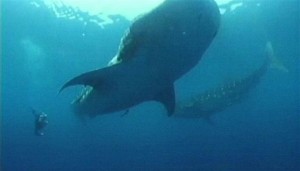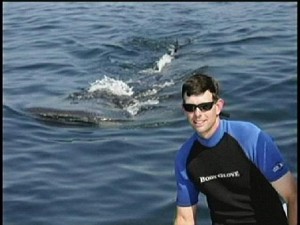BP Deep Horizon oil spill threatens the safety of whale sharks
 The latest hope for a clean-up of the British petroleum oil spill in the Gulf of Mexico was announced today. A humongous oil skimming vessel is heading to the gulf to attempt to absorb the contaminated water on either side of its bow. After being separated from the water, the oil is expected to be transferred to another vessel. The water would subsequently be channeled back into the sea. It is a complex operation for a ship which has never been tested. In the meantime the spill which has cost hundreds of millions of dollars so far to clean up, continues to taint more beaches and marine ecosystems. There is now evidence that whale sharks, a species which roam along the coast of Belize, may be the next victim of the spill. News Five’s Jose Sanchez reports.
The latest hope for a clean-up of the British petroleum oil spill in the Gulf of Mexico was announced today. A humongous oil skimming vessel is heading to the gulf to attempt to absorb the contaminated water on either side of its bow. After being separated from the water, the oil is expected to be transferred to another vessel. The water would subsequently be channeled back into the sea. It is a complex operation for a ship which has never been tested. In the meantime the spill which has cost hundreds of millions of dollars so far to clean up, continues to taint more beaches and marine ecosystems. There is now evidence that whale sharks, a species which roam along the coast of Belize, may be the next victim of the spill. News Five’s Jose Sanchez reports.
Jose Sanchez, Reporting
Even from satellite photos from space, the spread of the B.P. Deep Water Horizon spill is visible across the Gulf of Mexico. What is now also evident is that the existence of the whale shark, the largest fish species, is now under threat. Researchers in the gulf say that the oil has contaminated areas that the sharks would visit.
Via Phone: Eric Hoffmayer, Asst Research Scientist, University of Southern Mississippi
“Basically we have one research crew where we encountered a hundred animals last week.”
Jose Sanchez
“And the animals, where are they heading into the spill?”
Via Phone: Eric Hoffmayer
“We don’t know we only have four tags. This was sort of the first stab at getting a few animals tagged. Right now one animal has been reported pretty much on a daily basis but he’s hanging around the area where we encountered it. It hasn’t moved toward the spill. But we did get an unconfirmed report that they saw three whale sharks within four miles of the well head.”
Eric Hoffmayer has been following the species in the gulf.
Eric Hoffmayer
“These animals are in this region to feed. And in the area where the oil spill is, is an essential feeding area for them. It’s an essential habitat. And right now we don’t know how they are responding to this oil.”
In Belize, Whale sharks are visible near Gladden’s Spit. Diving with the massive fish has become a staple of the tourism industry for the Placencia Peninsula.
Melanie McField
“They’re sensitive and they’re also economically important. Gladden Spit alone is worth more than eight million Belize a year in tourism benefits to the local community. So that’s what a recent study by Conservation International found. Those were benefits that were accruing by benefiting the whale sharks—well, for Gladden Spit overall but the main attraction is those whale sharks. There are a few other places in the world that have booming ecotourism from divers that wanna get in the water with these large creatures that are very important to the ecosystem, they’re filter feeders, they’re not like top predators. So, they’re different than most sharks, that’s also making them more vulnerable right now because the way they feed, they open that big mouth suck in a lot of water and then they’re gills will get trapped, clogged with oil.”
“Yes there is migration routes but there is very little known about them. Rachel Gram, with Wildlife conservation Society, has tagged a number of sharks in Belize and they’ve looked at them and they’ve gone up past Mexico, into the gulf of Mexico, they’ve gone down to Honduras. I wasn’t able to download her tracks, just to double check where all they’ve been lately; but I know that they’re known to be wide ranging species. So they move around. We don’t know the differences some of the young, maybe like the ones we had here are only juveniles. SO where the large ones, those may spend their juvenile years, their teenage years rolling around this area and then they may go somewhere else when they’re adults. There’s a lot that is unknown about them.”
Jose Sanchez
“But there is a possibility that they could have into the further area where the gulf spill is?”
Melanie McField
“I think it’s a possibility that that has been shown by some of the tags that she had.”
Via Phone: Eric Hoffmayer
“It’s completely different up here than what goes on in Belize. They show up during the summer time to feed. And the two big feeding areas are in the mouth of river in the area of the spill which is a very bad situation. In the other possible feeding area, that’s about fifty miles from the spill. So, in a couple days these animals could be well within oil.”
Jose Sanchez
“Some of the whale sharks had come from the Belize or Honduras area, is that correct?”
Via Phone: Eric Hoffmayer
“Last year, two animals were photographed and within the Eco-Ocean database they showed that they originally photographed, one was from Utilla and one from Belize.”
Jose Sanchez
“So essentially the oil spill is affecting areas outside of the U.S. including Belize?”
Via Phone: Eric Hoffmayer
“Yes. I mean the fact that these animals are so large and migrate between regions yes. We are going to see impacts from here that will have wide ranging effects outside U.S. waters.”
Hoffmayer says that tagging whale sharks is the best way to monitor them in the region.
Eric Hoffmayer
“We have to start tagging these guys and look at their movements in relation to the oil to determine if indeed they are avoiding it or staying away. Or if they are actually going into it and succumb into the oil.”
Melanie McField
“It’s not just whale sharks; there are a lot of migratory ocean giants that move around. And they move the distance between Belize and the Gulf of Mexico it’s nothing for a tuna, or a marlin, or a sailfish, or a whale shark.”
Jose Sanchez
“And then we bring, that we’re just starting to explore for oil in our own country; it makes you more concerned doesn’t it?”
Melanie McField
“Yeah it is, that ‘s another concern but it means that things that we do here also have repercussions for species people in other places are depending on. It’s all very linked, I mean that’s the nature of the ocean. What you do in one place has very wide-ranging effects.”
Reporting for News Five Jose Sanchez.



What’s happening in the Gulf is a LEAK… not a Spill. A SPILL is a finite action, a LEAK IS ONGOING. No drilling off the coast of Belize.
The people that are concerned for Belize with regards to offshore drilling and the effect of pollution on the marine life, with the assistance from the Belize Government should look into financial
compensation. they should be ready with a plan for Belize. The hurricane season has started and it would be comforting to know that Belize and its natural resource is ready with a plan in the event
of any catastrophe brought on by the oil leak in the gulf of Mexico which is the responsibility and property of British Petroleum–BP
My dear Earl Grey, why must you argue semantics? Doesn’t a LEAK result in a SPILL? Isn’t there a finite amount of oil in the reservoir, so when it is all LEAKED it will be a SPILL? That argument seems pointless and circular because in order for there to be a spill there must be a leak. Ingenuous sophistry.
This is truly a tragedy for the whale sharks. Gentle creatures. Let us hope that they tap some primal instinct that averts their path from the oil, after all, oil is a natural thing made of the earth, so it makes sense that geological phenomena may have resulted in oil spills throughout history. Hopefully, our fellow earthlings will have some way of responding to such an event.
I will never forget my swim with the sharks…. it was amazing and every Belizean should get an opportunity to enjoy this experience. Sadly our leaders in Belize refuse to learn for the horrible experience in in the Gulf and seem hell-bent on risking our coast to the benefit of the oil companies. Shame on our leaders for never consulting the peopel and neglecting to take into account that others have been Belizean livelihoods are still dependent on these resources – so why give the oil companies priority over Belizeans?